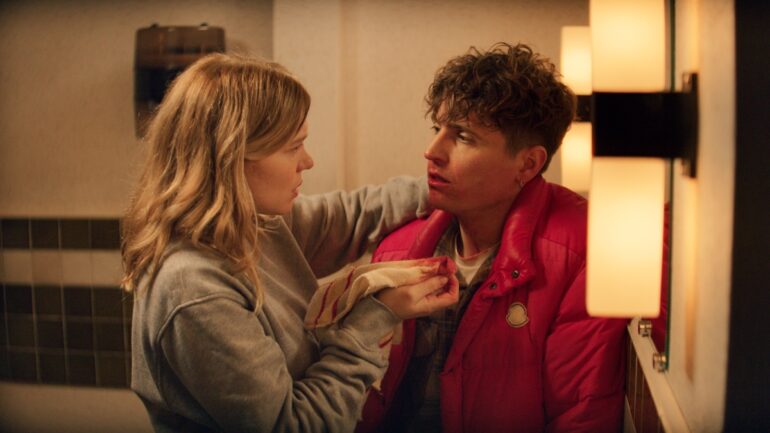Quentin Dupieux is a busy little bee. The 77th edition of the Cannes Film Festival opened with The Second Act (Le Deuxième Acte), the fifth film the renegade French director has made in three years. The efficiency of Dupieux’s work rate also extends to the films themselves. None of the five runs longer than 85 minutes and, like so much of his oeuvre to date, are all predicated on relatively simple plots which he infuses with surrealistic whimsy. They’re definitely not for everyone, especially when Dupieux can’t even confine himself to a genre; he followed the sarcastic superheroics of Smoking Causes Coughing with self-reflexive dramedy Yannick and admiring anti-biopic Daaaaaali!. The Second Act is probably the most accessible film he’s made yet, but it also suggests he needs to slow down a bit and work on his scripts a little longer.
Many women could fall in love with Louis Garrel, but apparently even Léa Seydoux couldn’t turn his head. The gorgeously Gallic pair play couple Florence and David, but before we meet them together, we see David walking to an isolated restaurant with his buddy Willy (Dupieux regular Raphaël Quenard) to meet her. David wants Willy to seduce the clingy Florence and take her off his hands. As they walk their dialogue feels forced, until some off-colour remarks see the pair discuss getting cancelled and acknowledging that they’re being filmed. Yes, it’s a movie within a movie, and a very here-and-now version to boot. Topics such as cancellation of public figures, #MeToo and pronoun use are touched upon by this pair, and there is laughter to be had with their egotistical concerns for their careers. It does also mean that the script they’re supposed to perform feels increasingly unnecessary, with no multiple takes and no sign of the director or producers running on set to admonish them. Dupieux is more interested in exploring these contemporary hot button topics, but in doing so reduces his own film to a vehicle for discussion, and not much else.
Florence is bringing her father Guillaume (Vincent Lindon) to meet David, and they’re engaged in character-breaking chat of their own. Why should Guillaume waste his time with this romance when he has an American director knocking on his door? These four actors are having a lot of fun sending up images of actorly importance, and giving their cineaste audience sly winks. Many of the issues and experiences they touch on are real, but Dupieux doesn’t give his own script time to develop these ideas. At once, he’s making a commentary, a farcical depiction of the filmmaking experience, and a film within a film. For a good portion of The Second Act, these strands fight amongst each other like the four leads bicker when out of character, but long before the end it’s clear only one of these films will come to anything.
David might have been able to get out of this meeting had he found the courage to tell Florence he doesn’t actually love her, but too late now! The isolated restaurant setting makes sure there’s no chance of escape, but Dupieux can’t focus his writing enough to bring out the Buñuelian potential of this farcical setup. While the four leads commit aggressions (both micro and macro) against each other, their waiter (Manuel Guillot) struggles with his nerves while trying to pour their wine. The levels of humour in The Second Act are competing for air, as the film tries to be clever and dumb all at once. By the time we finally find out who is directing this film, it becomes clear that Dupieux has hedged his bets all the way through, settling for the most obvious satirical targets.
After much bickering, discussion, a smattering of gunfire and the most superfluous tracking shot you’ll ever see, what does The Second Act add up to? Not very much, but there are enough sharp lines, belly laughs and moments of insight between the gaps where the point should be. Much like his characters, Dupieux would do better to stop blathering and get on with the job.
A release date for The Second Act has yet to be confirmed

